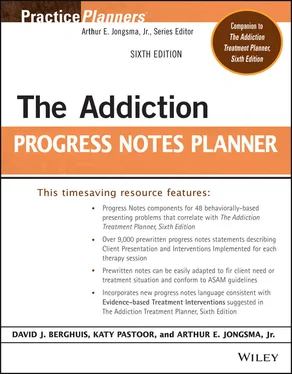The Addiction Progress Notes Planner
Здесь есть возможность читать онлайн «The Addiction Progress Notes Planner» — ознакомительный отрывок электронной книги совершенно бесплатно, а после прочтения отрывка купить полную версию. В некоторых случаях можно слушать аудио, скачать через торрент в формате fb2 и присутствует краткое содержание. Жанр: unrecognised, на английском языке. Описание произведения, (предисловие) а так же отзывы посетителей доступны на портале библиотеки ЛибКат.
- Название:The Addiction Progress Notes Planner
- Автор:
- Жанр:
- Год:неизвестен
- ISBN:нет данных
- Рейтинг книги:5 / 5. Голосов: 1
-
Избранное:Добавить в избранное
- Отзывы:
-
Ваша оценка:
- 100
- 1
- 2
- 3
- 4
- 5
The Addiction Progress Notes Planner: краткое содержание, описание и аннотация
Предлагаем к чтению аннотацию, описание, краткое содержание или предисловие (зависит от того, что написал сам автор книги «The Addiction Progress Notes Planner»). Если вы не нашли необходимую информацию о книге — напишите в комментариях, мы постараемся отыскать её.
The Addiction Progress Notes Planner, Sixth Edition
Addictions Treatment Planner, Sixth Edition
Addiction Treatment Planner, Sixth Edition
The Addiction Progress Notes Planner
The Addiction Progress Notes Planner — читать онлайн ознакомительный отрывок
Ниже представлен текст книги, разбитый по страницам. Система сохранения места последней прочитанной страницы, позволяет с удобством читать онлайн бесплатно книгу «The Addiction Progress Notes Planner», без необходимости каждый раз заново искать на чём Вы остановились. Поставьте закладку, и сможете в любой момент перейти на страницу, на которой закончили чтение.
Интервал:
Закладка:
43 Develop Relapse Drill (43)The client and family were assisted in drawing up a “relapse drill,” detailing roles and responsibilities.Family members were asked to take responsibility for specific roles (e.g., who will call a meeting of the family to address potential relapse; who will call the physician, schedule a serum level, or contact emergency services, if needed).Obstacles to providing family support to the client's potential relapse were reviewed and resolved.The family was asked to make a commitment to adherence to the plan.The family was reinforced for their commitment to adherence to the plan.The family has not developed a clear commitment to the relapse prevention plan and was redirected in this area.
44 Conduct Interpersonal and Social Rhythm Therapy (44)An assessment was conducted of the client's daily activities using an interview and the social rhythm metric.Information from the interview and social rhythm metric helped to conduct interpersonal and social rhythm therapy.
45 Establish Routine Daily Activities (45)The client was provided with the rationale for an optimal social rhythm.The client was assisted in establishing a more routine pattern of daily activities.The client was assisted in identifying a routine pattern of sleeping, eating, solitary and social activities, and exercise.A form was developed to help review and schedule activities.An emphasis was placed on creating a predictable rhythm for each day.
46 Teach About Sleep Hygiene Importance (46)The client was taught about the importance of good sleep hygiene.The client was assigned the “Sleep Pattern Record” from the Adult Psychotherapy Homework Planner (Jongsma & Bruce).The client's sleep pattern was routinely assessed.Interventions for the client's sleep pattern were provided, as they have been noted to have a dysfunctional sleep pattern.
47 Engage in Behavioral Activation (47)The client was engaged in “behavioral activation” by collaboratively identifying and scheduling activities that have a high likelihood for pleasure and mastery.The client was directed to complete tasks from the “Identify and Schedule Pleasant Activities” assignment from the Adult Psychotherapy Homework Planner (Jongsma & Bruce).Rehearsal, role-playing, role reversal, and other techniques were used to engage the client in behavioral activation.The client was reinforced for successes in scheduling activities that have a high likelihood for pleasure and mastery.The client has not engaged in pleasurable activities and was redirected to do so.
48 Conduct Interpersonal Portion of Therapy (48)The interpersonal component of the interpersonal and social rhythm therapy techniques was initiated.An assessment was completed of the client's current and past significant relationships, including themes related to grief, interpersonal role disputes, role transitions, and skill deficits.The client was supported in reviewing concerns related to interpersonal relationships.
49 Use Interpersonal Therapy Techniques to Resolve Interpersonal Problems (49)Interpersonal therapy techniques were used to explore and resolve issues surrounding grief, role disputes, and role transitions.The client was provided with direction and training in regard to skill deficits.Support and strategies for resolving identified interpersonal issues were provided.
50 Establish a Rescue Protocol (50)A rescue protocol was developed in order to identify and manage clinical deterioration.Specific factors that would trigger the rescue protocol were identified.Specific factors of the rescue protocol were developed, including medication use, sleep pattern restoration, daily routine, and conflict-free social support.The client and significant others were reinforced for their use of the rescue protocol.The client and significant others were redirected in regard to the use of the rescue protocol.
51 Schedule “Maintenance Sessions” (51)The client was scheduled for a “maintenance session” between 1 and 3 months after therapy ends.The client was advised to contact the therapist if they need to be seen before the “maintenance session.”The client's “maintenance session” was held and the client was reinforced for successful implementation of therapy techniques.The client's “maintenance session” was held and the client was coordinated for further treatment, as progress has not been sustained.
52 Assign Reading on Bipolar Disorder (52)The client was assigned to read a book on bipolar disorder.The client was assigned to read The Bipolar Disorder Survival Guide (Miklowitz).The client was assigned to read The Bipolar Disorder Workbook (Forester & Gregory).The client was assigned to read Bipolar 101 (White & Preston).The client has read the assigned information on bipolar disorder and key concepts were reviewed.The client has not read the assigned information on bipolar disorder and was redirected to do so.
53 Outline Recovery Components (53)The client was assisted in outlining the essential components for managing manic/hypomanic states and addiction (i.e., taking medication, complying with medical monitoring, continuing therapy, attending therapy groups regularly, using a higher power, getting a sponsor, helping others in recovery).The client was assigned “Personal Recovery Planning” in the Addiction Treatment Homework Planner (Lenz, Finley, & Jongsma).The client was reinforced in endorsing recovery plan components.The client has implemented recovery plan components to assist in managing manic/hypomanic states and addiction; this was reinforced.The client has not been using recovery plan components and was redirected to do so.
54 Discuss Discharge Plan/Environment (54)Today's session focused on discharge planning and on assisting the client in deciding what environment is needed in early recovery.Active listening was provided as the client endorsed a healthy discharge plan and identified the environment needed in early recovery.The client has been reluctant to endorse specific discharge plans and was urged to be more direct in this area.The client is uncertain about the recovery environment that they must use in order to have a successful early recovery; specific feedback was provided.
55 Assign Step 4 Exercise (55)The client was taught about a 12-step recovery program's Step 4, focusing on the detailing of the exact nature of their wrongs.The client was directed to write an autobiography detailing the exact nature of their wrongs.The client has completed the autobiography, has detailed the exact nature of their wrongs, and has shared this with someone in recovery; the reaction of the support person was processed.The client has not completed the Step 4 exercise and was redirected to do so.
56 Develop Recovery Plan (56)The client was taught about the importance of working a program of recovery that includes attending recovery group meetings regularly and helping others.The client was assisted in developing a recovery program.The client was reinforced in describing active pursuit of the elements of the recovery program.The client has not followed through on a recovery program and was redirected to do so.
57 Develop 12-Step Program Contact (57)A contact with a representative of a 12-step program was coordinated.The client was assigned to talk to the 12-step program contact person about manic/hypomanic states and addiction.The client reported a helpful conversation with a 12-step recovery program contact person, including insight into manic/hypomanic states and addiction; this progress was reinforced.The client has not made contact with a 12-step recovery program's representative and was encouraged to do so.
58 Assess Satisfaction (58)A treatment satisfaction survey was administered to the client.The client's survey responses indicated a high level of satisfaction with treatment services; these results were processed.The client's survey responses indicated a medium level of satisfaction with treatment services; these results were processed.The client's survey responses indicated a low level of satisfaction with treatment services; these results were processed.Although the client was encouraged to complete a treatment satisfaction survey, it was refused.
Читать дальшеИнтервал:
Закладка:
Похожие книги на «The Addiction Progress Notes Planner»
Представляем Вашему вниманию похожие книги на «The Addiction Progress Notes Planner» списком для выбора. Мы отобрали схожую по названию и смыслу литературу в надежде предоставить читателям больше вариантов отыскать новые, интересные, ещё непрочитанные произведения.
Обсуждение, отзывы о книге «The Addiction Progress Notes Planner» и просто собственные мнения читателей. Оставьте ваши комментарии, напишите, что Вы думаете о произведении, его смысле или главных героях. Укажите что конкретно понравилось, а что нет, и почему Вы так считаете.












